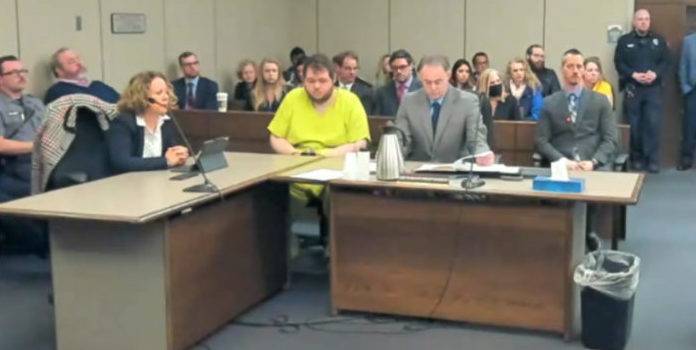(Headline USA) The gender-nonbinary suspect accused of entering a Colorado gay nightclub clad in body armor and opening fire, killing five people and wounding 17 others, was charged by prosecutors Tuesday with 305 criminal counts including hate crimes and murder.
Investigators say Anderson Lee Aldrich, 22, entered Club Q just before midnight on Nov. 19 and began shooting during a drag queen’s birthday celebration. The killing stopped after patrons wrestled the suspect to the ground, beating Aldrich into submission, they said.
Judge Michael McHenry ordered the arrest warrant affidavit in the case to be unsealed on Wednesday, over the objections defense attorney Joseph Archambault who said he was concerned about the defendant’s right to a fair trial due to publicity surrounding the case.
The counts against Aldrich include 48 hate crime charges, one for each person known to have been in the club at the time of the shooting. However, the case may be complicated by the fact that Aldrich themself identifies as a part of the LGBT community and uses the third-person plural pronouns.
That bombshell revelation threw leftist media and Democrat lawmakers for a loop after they sought to project onto the tragic attack a baseless accusation that it was inspired by conservative opposition to the radical transgender efforts to indoctrinate and sexualize young children.
Left-wing academics recently coined the vague term “stochastic terrorism” to describe any rhetoric or opinions they find objectionable that they may, in turn, blame for random acts of mass violence—even though they themselves have often been the instigators of such acts.
Aldrich sat upright in a chair during the hearing Tuesday and appeared alert. In an earlier court appearance just a few days after the shooting, the defendant was slumped over—head and face covered with bruises—and had to be prompted by attorneys to respond to questions from a judge.
The shooting came more than a year after Aldrich was arrested following a standoff with SWAT teams after authorities say Aldrich threatened to stockpile guns, ammo and body armor to become the “next mass killer.” But charges were dropped, the record is sealed and prosecutors say they can’t legally talk about what happened.
Of the 48 hate crime charges, 27 counts involve injuries and 21 involve people fearing injury or property damage. In addition to those killed or wounded by gunfire at the club, police have said five people had non-gunshot injuries and other victims had “no visible injuries.”
Aldrich had been held on hate crime charges following the attack but prosecutors had said previously they weren’t sure whether those counts would stick because they needed to assess if there was adequate evidence to show it was a bias-motivated crime.
District Attorney Michael Allen had noted that murder charges would carry the harshest penalty—likely life in prison—but also said it was important to show the community that bias-motivated crimes are not tolerated if there was evidence to support the charge.
At a news conference after the court hearing, Allen declined to discuss what evidence prosecutors found to back the hate crimes counts. However, he said a recent change in Colorado law allows offenders to be charged with hate crimes even if they are only partially motivated by bias.
“If it was not for that change we would probably not be able to charge it in this case,” he said.
Allen said the suspect being nonbinary was “part of the picture” in considering hate crime charges but he wouldn’t elaborate.
“We are not going to tolerate actions against community members based on their sexual identity,” Allen said. “Members of that community have been harassed, intimidated and abused for too long.”
Legal experts say someone who is nonbinary can be charged with a hate crime for targeting fellow members of the LGBTQ community because hate crime laws are focused on the victims, not the perpetrator.
But bringing a hate crime case to conviction can be difficult, because prosecutors must prove what motivated the defendant, a higher standard than usually required in court.
Colorado prosecutors will need concrete evidence such as statements Aldrich may have made about the shooting, said Frank Pezzella, an associate professor at John Jay College of Criminal Justice.
“It’s got to be more than he [sic] shot up Club Q,” Pezzella said.
According to witnesses, Aldrich fired first at people gathered at the club’s bar before spraying bullets across the dance floor during the attack, which came on the eve of an annual day of remembrance for transgender people lost to violence.
Authorities have yet to explain why they didn’t attempt to seize the defendant’s guns last year under Colorado’s “red flag” law after Aldrich was accused of threatening to kill their grandparents if they stood in the way of Aldrich’s plans to become a mass killer.
Aldrich was booked into jail on suspicion of felony menacing and kidnapping but it’s unclear why the charges weren’t pursued.
Ring doorbell video obtained by the AP shows Aldrich arriving at their mother’s front door with a big black bag, telling her the police were nearby and adding, “This is where I stand. Today I die.”
Adapted from reporting by the Associated Press

